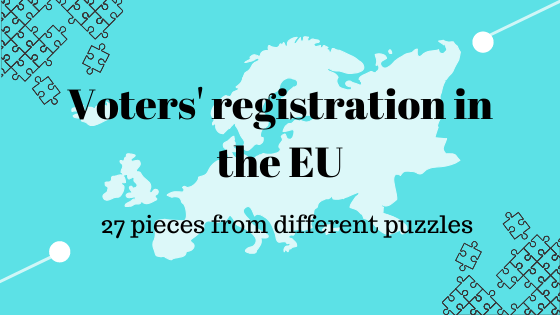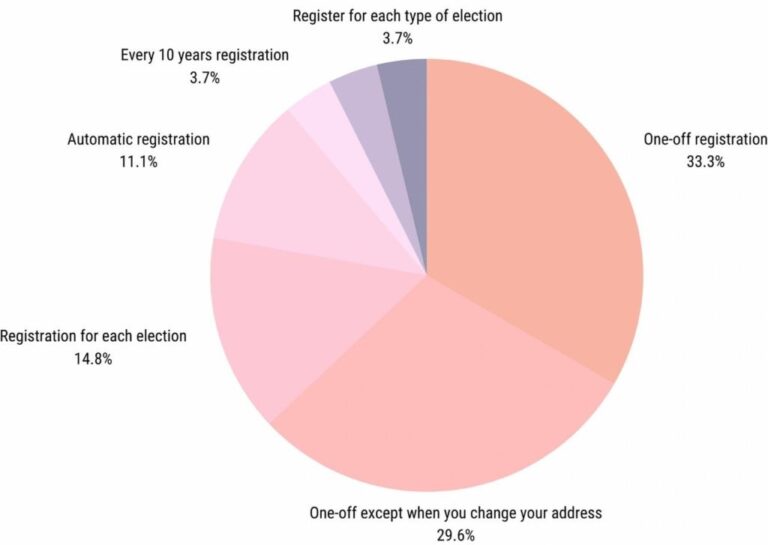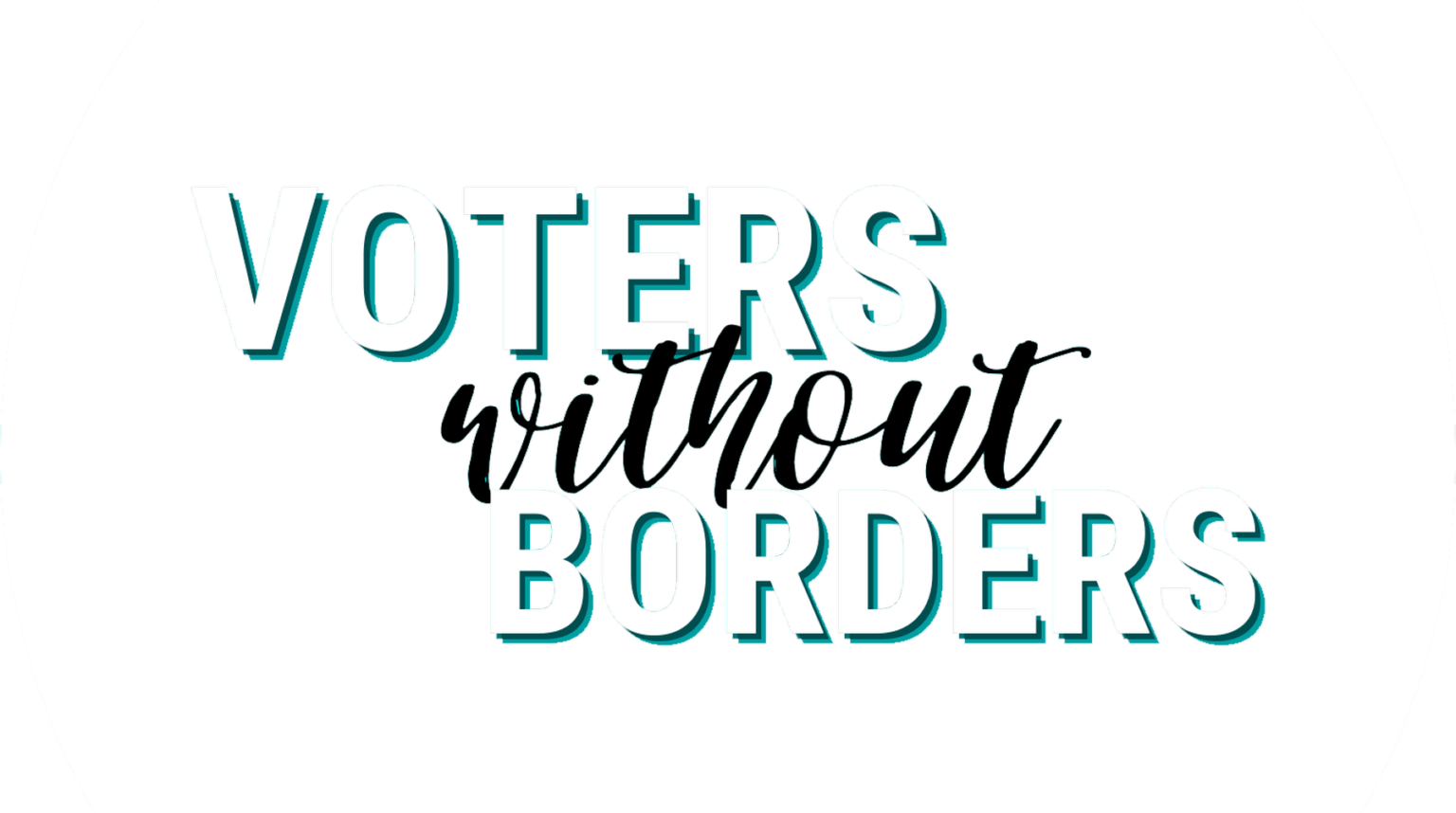Voters' Registration In The EU

It could seem common sense for all the Member States to harmonise their methods when it comes to voters’ registration in the EU so that it would be easier for all the EU mobile citizens to have only one system to refer to. However, every Member State has its own system despite the difficulties it represents for non-citizen residents that are forced to have a lot of adaptation skills while just exercising their right to freedom of movement. A variety of systems exist in terms of registration. Some of the EU Member States use automatic registration, whilst others force EU mobile citizens to register for every single election, whereas another big category is to offer a one-off registration method. There are also other methods that exist too, for instance, registration for every type of election. In this big and disorderly Union, it becomes then extremely difficult to understand how, when and where to register when you want to exercise the rights conferred by the EU treaties under articles 20(2)b and 22 of the TFEU.

There is a total of seven different types of expectations for voters’ registration in the EU/across the different EU Member States. In 9 Member States[1], EU mobile citizens have to register only once for every election in which they are entitled to vote, this is the most widespread system. In 8 EU Member States[2], they have to register only once unless they change their address, in which case they have to register again. In 4 EU Member States[3], they have to register in every single election they want and are entitled to vote in. In only 3 EU Member States[4], EU mobile citizens do not have to register: there is automatic registration. In 1 EU Member State[5], they have to register only once for each type of election they are entitled to vote in. In another EU Member State[6], they have to register every ten years. In the last EU Member state, Ireland, with the exception of United Kingdom nationals, they have to fill a complementary form to the registration before each election [7].
As these numbers show, there is no harmonisation among EU Member States, thus EU mobile citizens have to be aware of the very specific registration system of the country they live in. Unfortunately, though, this information is sometimes quite difficult to get.
We could wonder if automatic registration should not be the norm in all the EU Member States, as it seems to be the easier registration system both for EU mobile citizens and national electoral authorities. However, a problem would then appear: it is essential that in the process of voting, EU mobile citizens still have the choice — you might live in another Member State but still want to participate in the life of your hometown, because you think your voice will be more important there, you want to go back there afterwards or any other reason. This is why automatic registration without allowing a choice would also be a threat to the democratic rights of voting where it matters the most to you.
As written before, the most used system is the one-off active registration, which has both good and bad aspects: the good aspect is that you alone have to do it once and it then reduces a lot the paperwork compared to doing it several times. It also allows the choice of where you want to vote since it requires the action of going and registering in the city or country you want to between your residency and your nationality. Nevertheless, there is still the problem of paperwork and administrative complications. Same goes for the system that asks to register for each type of election and the one who requires to register every 10 years. They are, of course, a bit more demanding but are still quite EU mobile citizens-friendly compared to others.
One of the other systems that is used by a great number of Member States is the one-off active registration, except if you change your address. It has basically the same advantages as the one-off active registration, but it adds one difficulty: registering every time you move (which can be often when you settle in another country).
Then, a less-used system is to register for every election or to fill a complementary form before each election. This is a big obstacle for EU mobile citizens to use their voting rights. Indeed, it is a lot of paperwork asked only to be eligible for one of the most important fundamental rights.
Most of these systems are questionable for many reasons but the biggest legal reason is still the discrimination it creates between citizens and non-citizen residents. According to Article 18 of the Treaty on the Functioning of the European Union “Within the scope of application of the Treaties, and without prejudice to any special provisions contained therein, any discrimination on grounds of nationality shall be prohibited” and, in these cases, this principle of non-discrimination is not respected. Based on their nationalities, EU mobile citizens do not have the same conditions than national residents when it comes to registration, whereas it should not be that difficult to permit them all to benefit from an easier system.
Voters Without Borders aims to strengthen the already existing rights and it starts with a harmonisation of the registration systems for them to have better access to voting rights. Read more about our ECI proposal here.
[1] Austria, Belgium, Bulgaria, Cyprus, France, Germany, Italy, Malta and Denmark; http://globalcit.eu/databases/ Global Citizenship Observatory: conditions for electoral rights 2019 database, European elections.
[2] Estonia, Luxembourg, Netherlands, Portugal, Slovakia, Slovenia, Spain and Sweden; http://globalcit.eu/databases/ Global Citizenship Observatory: conditions for electoral rights 2019 database, European elections.
[3] Croatia, Finland, Greece and Poland; http://globalcit.eu/databases/ Global Citizenship Observatory: conditions for electoral rights 2019 database, European elections.
[4] Latvia, Lithuania and Romania ; http://globalcit.eu/databases/ Global Citizenship Observatory: conditions for electoral rights 2019 database, European elections.
[5] Czech Republic ; http://globalcit.eu/databases/ Global Citizenship Observatory: conditions for electoral rights 2019 database, European elections.
[6] Hungary ; http://globalcit.eu/databases/ Global Citizenship Observatory: conditions for electoral rights 2019 database, European elections.
[7] http://globalcit.eu/databases/ Global Citizenship Observatory: conditions for electoral rights 2019 database, European elections.
